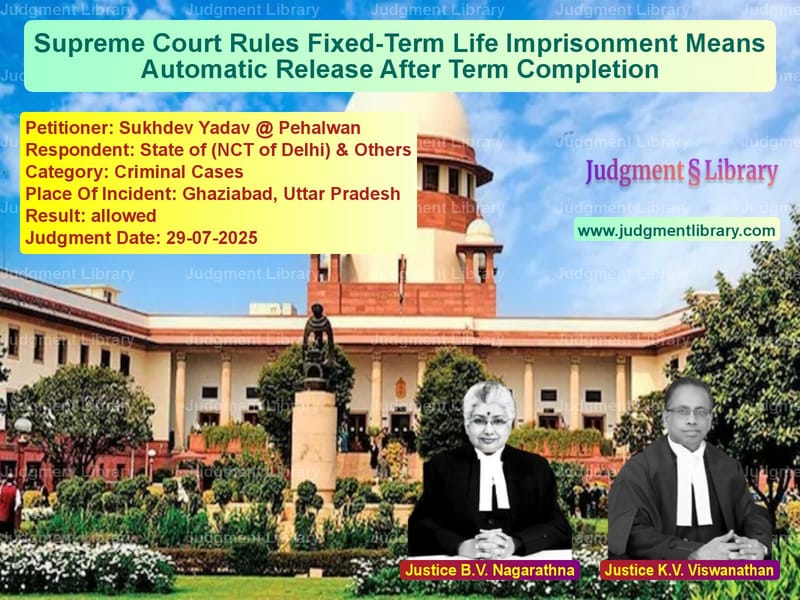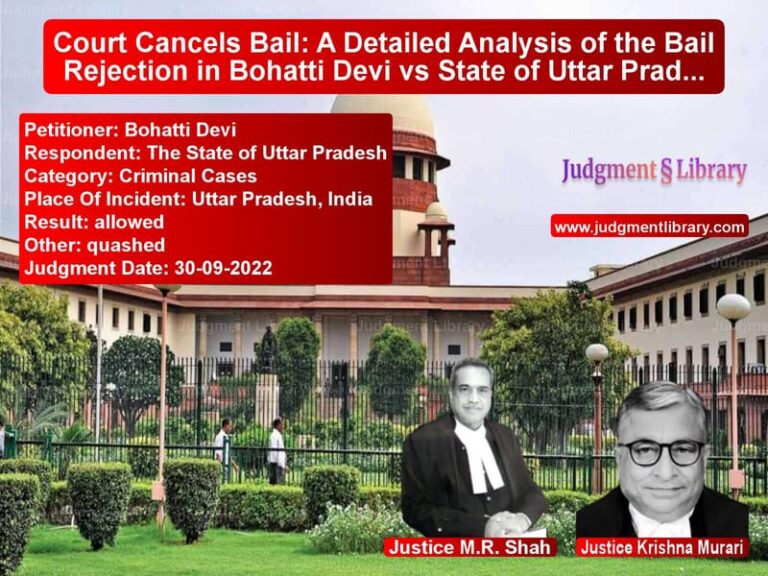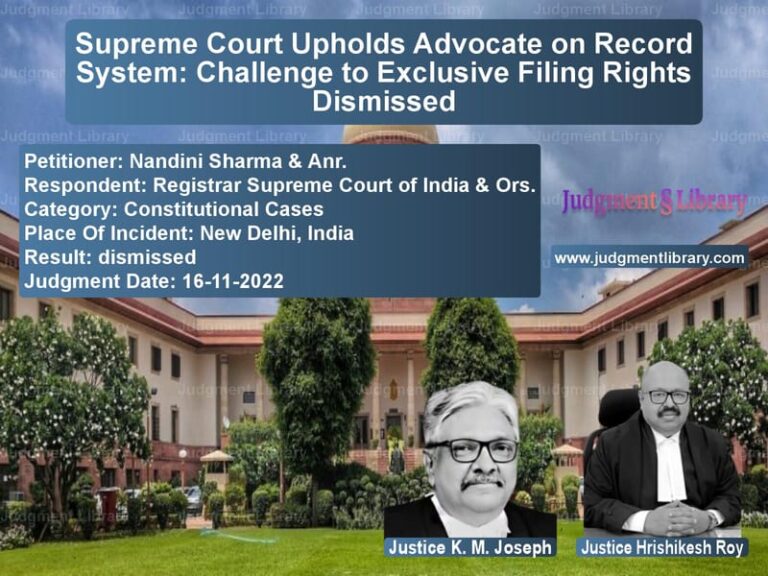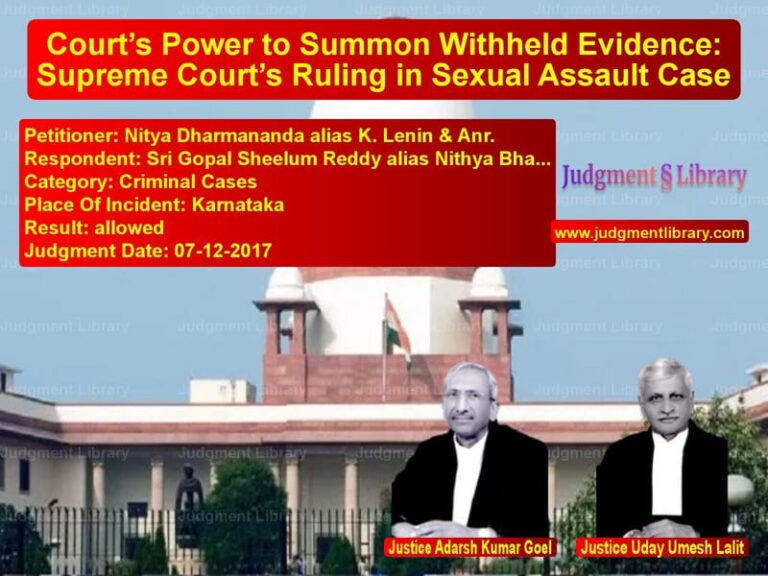Supreme Court Rules Fixed-Term Life Imprisonment Means Automatic Release After Term Completion
In a landmark judgment that clarifies the legal position regarding fixed-term life imprisonment, the Supreme Court of India has ruled that when a court specifies that life imprisonment shall be for a fixed period of actual imprisonment without remission, the convict is entitled to be released upon completion of that term and need not apply for remission. The case involved Sukhdev Yadav @ Pehalwan, who had been convicted for his role in the infamous Nitish Katara murder case and was sentenced to “life imprisonment which shall be 20 years of actual imprisonment without consideration of remission.”
The legal battle began when Sukhdev Yadav completed his 20-year actual imprisonment term on March 9, 2025, but the State of Delhi refused to release him, arguing that he needed to apply for remission of his life sentence. This led to the Supreme Court examining the fundamental question of whether a convict who has completed a fixed term of life imprisonment without remission is entitled to automatic release.
The Case Background
Sukhdev Yadav was convicted along with Vikas Yadav and Vishal Yadav for the murder of Nitish Katara. The Delhi High Court, in its judgment dated February 6, 2015, had specifically sentenced Sukhdev Yadav to “Life imprisonment which shall be 20 years of actual imprisonment without consideration of remission, and fine of Rs.10,000.” This sentence was later affirmed by the Supreme Court with minor modifications. After completing his 20-year term on March 9, 2025, Yadav sought release, but the State authorities refused, leading to the current legal proceedings.
Arguments Presented
Senior counsel Sri Siddharth Mridul, appearing for the appellant Sukhdev Yadav, made compelling arguments for his client’s immediate release. He contended that “the appellant has complied with the sentence imposed on him and learned Additional Solicitor General appearing for the respondent(s)-State has also acknowledged the fact that he has completed twenty years of actual imprisonment. In the circumstances, the appellant is entitled to be released on completion of his sentence.”
Mridul further argued that “there is a distinction between release from jail on completion of sentence of imprisonment and remission of a sentence. He pointed out that remission of a sentence is considered when the sentence is not yet complete whereas release from jail is only upon completion of the period of incarceration that the convict was sentenced to undergo.”
On the other side, the State represented by ASG Ms. Archana Pathak Dave contended that “the appellant has been sentenced to undergo life imprisonment. That the period of incarceration being twenty years is to be construed as the period without remission. However, on completion of the period of twenty years, the Sentence Review Board would have to consider whether the appellant is entitled to be released from jail or not.”
The State’s position was that “having regard to the serious crime in which the appellant has been convicted of and the fact that he has sustained the sentence of life imprisonment, he cannot straightaway seek release from jail in the absence of any application being made seeking remission of his sentence.”
Court’s Analysis and Reasoning
The Supreme Court bench comprising Justices B.V. Nagarathna and K.V. Viswanathan delivered a comprehensive judgment analyzing the legal position regarding life imprisonment and remission. The court examined the sentence imposed on Sukhdev Yadav, which stated: “Life imprisonment which shall be 20 years of actual imprisonment without consideration of remission, and fine of Rs.10,000/–.”
The court made several crucial observations about the nature of this sentence. It noted that “the word ‘which’ used after the words ‘life imprisonment’, is an interrogative pronoun, related pronoun and determiner, referring to something previously mentioned when introducing a clause giving further information. Therefore, the sentence of life imprisonment is determined as twenty years which is of actual imprisonment.”
The judgment extensively referenced previous Supreme Court decisions, particularly the Constitution Bench ruling in Union of India vs. V. Sriharan (2016) which had established that higher courts can impose fixed-term life sentences. The court observed that “the power to impose a modified punishment providing for any specific term of incarceration or till the end of the convict’s life as an alternate to death penalty, can be exercised only by the High Court and the Supreme Court and not by any other inferior court.”
Addressing the core issue, the court stated: “The sentence imposed on the appellant herein, inter alia, is recapitulated as under: ‘Life imprisonment which shall be 20 years of actual imprisonment without consideration of remission, and fine of Rs.10,000/–.'” The court emphasized that “during the period of twenty years the appellant was not entitled to seek any remission” and consequently, “on completion of twenty years of actual imprisonment, the appellant is entitled to be released.”
Key Legal Principles Established
The Supreme Court laid down several important legal principles in its judgment. It clarified that “in all cases where an accused/convict has completed his period of jail term, he shall be entitled to be released forthwith and not continued in imprisonment if not wanted in any other case. We say so in light of Article 21 of the Constitution of India which states that no person shall be deprived of his life or personal liberty except according to procedure established by law.”
The court made a crucial distinction between remission and completion of sentence, noting that “the appellant is not under an obligation to make an application seeking remission of his sentence on completion of twenty years. This is simply for the reason that the appellant has completed his twenty years of actual imprisonment and in fact, during the period of twenty years, the appellant was not entitled to any remission.”
In strong terms, the court observed that “the Sentence Review Board cannot sit in judgment over what has been judicially determined as the sentence by the High Court which has been affirmed by this Court. There cannot be any further incarceration of the appellant herein from 09.03.2025 onwards.” The court even declared that “the continuous incarceration of the appellant from 09.03.2025 onwards was illegal. In fact, on 10.03.2025, the appellant ought to have been released from prison as he had completed the sentence imposed on him by the High Court as affirmed by this Court.”
Broader Implications and Directions
Recognizing the wider implications of its ruling, the Supreme Court issued directions to prevent similar situations across the country. The court ordered that “a copy of this order shall be circulated by the Registry of this Court to all the Home Secretaries of the States/Union Territories to ascertain whether any accused/convict has remained in jail beyond the period of sentence and if so, to issue directions for release of such accused/convicts, if not wanted in any other case.”
Additionally, the court directed that “a copy of this order shall also be sent by the Registry of this Court to the Member Secretary, National Legal Services Authority for onward transmission to all Member Secretaries of the States/Union Territories Legal Services Authorities for communication to all the Member Secretaries of the District Legal Services Authorities in the States for the purpose of implementation of this judgment.”
The court referenced its earlier decision in Bhola Kumar vs. State of Chhattisgarh (2022) to emphasize the seriousness of illegal detention, noting that “when such a convict is detained beyond the actual release date it would be imprisonment or detention sans sanction of law and would thus, violate not only Article 19(d) but also Article 21 of the Constitution of India.”
Conclusion
The Supreme Court’s judgment brings much-needed clarity to the legal position regarding fixed-term life imprisonment sentences. By ruling that Sukhdev Yadav was entitled to release upon completing his 20-year term without the need for remission proceedings, the court has reinforced the principle that once a judicial sentence is completed, the executive cannot extend incarceration through procedural requirements. The judgment serves as an important safeguard against illegal detention and upholds the fundamental right to personal liberty under Article 21 of the Constitution. The court’s directions for nationwide implementation ensure that other prisoners in similar situations will benefit from this clarification of the law.
Petitioner Name: Sukhdev Yadav @ Pehalwan.Respondent Name: State of (NCT of Delhi) & Others.Judgment By: Justice B.V. Nagarathna, Justice K.V. Viswanathan.Place Of Incident: Ghaziabad, Uttar Pradesh.Judgment Date: 29-07-2025.Result: allowed.
Don’t miss out on the full details! Download the complete judgment in PDF format below and gain valuable insights instantly!
Download Judgment: sukhdev-yadav-@-peha-vs-state-of-(nct-of-del-supreme-court-of-india-judgment-dated-29-07-2025.pdf
Directly Download Judgment: Directly download this Judgment
See all petitions in Murder Cases
See all petitions in Bail and Anticipatory Bail
See all petitions in Custodial Deaths and Police Misconduct
See all petitions in Judgment by B.V. Nagarathna
See all petitions in Judgment by K.V. Viswanathan
See all petitions in allowed
See all petitions in supreme court of India judgments July 2025
See all petitions in 2025 judgments
See all posts in Criminal Cases Category
See all allowed petitions in Criminal Cases Category
See all Dismissed petitions in Criminal Cases Category
See all partially allowed petitions in Criminal Cases Category







